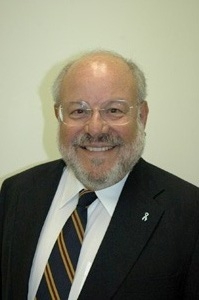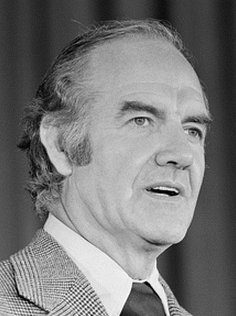Image from wikipedia
George McGovern, who has just died, was prescient about America. When he ran for president 40 years ago, he well-understood what the federal government of the United States had become, among other national dysfunctions.
It's a shame he wasn't given an opportunity to, as president, change things.
In June 1972, I conducted a half-hour interview with then Senator McGovern as he campaigned for president on Long Island, New York, where I was a reporter for the Long Island Press.
"This administration," he said of the Richard Nixon's presidency, "is dominated by big business and big oil and big utilities. It's really a big business operation. They give them anything they want: tax concessions, wage-price controls that have no restraints on big business."
The Nixon administration had just quashed a Department of Justice anti-trust action against International Telephone & Telegraph, ITT, emerging then under its CEO Harold Geneen as the model of a modern monopoly extending its reach by gobbling up companies. The Nixon administration "let ITT buy their way out of" this anti-trust action, McGovern charged. ITT provided Nixon with major campaign contributions.
As to the situation if Nixon were re-elected president, "I really have a grim view of another four years of this kind of trickery and manipulation and credibility problems and secret deals and power politics and special interest politics. Letting the ITTs of the country run the government instead of the other way around," said McGovern. "I really believe this present administration is dominated by the greediest interests in the country."
The Vietnam War was still raging, and McGovern said: "The Vietnam War has virtually destroyed the unity of the nation, destroyed the unity of the Democratic Party. But I think a new coalition of peace and change priorities here at home is now forming around my candidacy. I believe I now stand in the mainstream of the American people."
As to the difference if he became president instead of Nixon, "First of all there wouldn't be any war. Secondly, I'd remove wage and price controls. I don't think that it would be necessary to keep them if the war was over. Thirdly, there'd be a very substantial shift of resources away from war spending to building up the country, in terms of better facilities of all kinds: housing, transportation, health care, education and so forth."
At the time, the oil industry was pushing to drill in Atlantic offshore waters--as it is again--and McGovern took a stand against it declaring that "the technology is not sufficiently advanced to protect us against oil spills." He described offshore drilling in the Atlantic as "a threat to the beaches, the fishing interests, to the purity of the water." Of nuclear power, he said "we have to delay further nuclear plant construction" because of the thermal impacts of nuclear plants on water bodies. He said "to operate those nuclear plants you have that hot water being dumped into nearby streams. That eventually destroys the stream, or the lake, or whatever it is into which the spill-off occurs." As to sources of energy, he emphasized "solar power and other cleaner sources of energy."
As to how the nation could adjust to a termination of the Vietnam War, McGovern said: "After World War II we dismantled a military machine that was consuming 40 percent of our gross national product. We did it without any recession. People went into other jobs because the priorities were set in such a way that there was employment. I can think of various things: the building of public transit facilities, construction of environmental protection devices"any number of things that are needed where that talent and labor can be utilized."
Of the then infamous and huge generation gap, he said: "My candidacy could bridge the gap because there's certain interests that young people and older people share in common"Everybody would welcome a return to trust and confidence in a president."
He stressed his consistency on issues. "I've not gone back on my word. I've consistently followed through. I've not switched around. I've stuck to my principles."
And, indeed, he was a man of principle.
Sadly, McGovern lost the 1972 election to the unprincipled Nixon.
(Note: You can view every article as one long page if you sign up as an Advocate Member, or higher).






